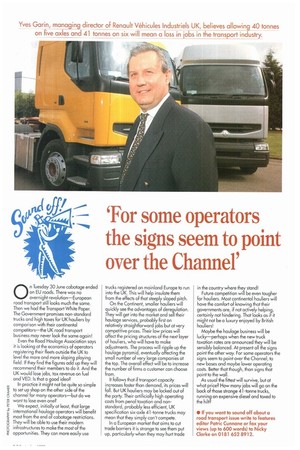Tor some operators the signs seem to point over the Channel'
Page 55

If you've noticed an error in this article please click here to report it so we can fix it.
Yves Garin, managing director of Renault Vehicules lndustriels UK, believes allowing 40 tonnes on five axles and 41 tonnes on six will mean a loss in jobs in the transport industry.
0n Tuesday 30 June cabotage ended on EU roads. There was no overnight revolution—European road transport still looks much the same. Then we had the Transport White Paper. The Government promises non-standard trucks and high taxes for UK hauliers by comparison with their continental competitors—the UK road transport business may never look the same again!
Even the Road Haulage Association says it is looking at the economics of operators registering their fleets outside the UK to level the more and more sloping playing field. If they Find the figures add up they will recommend their members to do it. And the UK would lose jobs, tax revenue on fuel and VED. Is that a good idea? In practice it might not be quite so simple to set up shop on the other side of the channel for many operators—but do we want to lose even one?
We expect, initially at least, that large international haulage operators will benefit most from the end of cabotage restrictions. They will be able to use their modern infrastructures to make the most of the opportunities. They can more easily use trucks registered on mainland Europe to run into the UK. This will help insulate them From the effects of that steeply sloped pitch. On the Continent, smaller hauliers will quickly see the advantages of deregulation. They will get into the market and sell their haulage services, probably first on relatively straightforward jobs but at very competitive prices. Their low prices will affect the pricing structures of the next layer of hauliers, who will have to make adjustments. The process will ripple up the haulage pyramid, eventually affecting the small number of very large companies at the top. The overall effect will be to increase the number of firms a customer can choose from.
It Follows that if transport capacity increases Faster than demand, its prices will fall. But UK hauliers may be locked out of the party. Their artificially high operating costs from penal taxation and nonstandard, probably less efficient, UK specification six-axle 41 -tonne trucks may mean that they simply can't compete. In a European market that aims to cut trade barriers it is strange to see them put up, particularly when they may hurt trade in the country where they stand! Future competition will be even tougher for hauliers. Most continental hauliers will have the cornfort of knowing that their governments are, if not actively helping, certainly not hindering. That looks as if it might not be a luxury enjoyed by British hauliers!
Maybe the haulage business will be lucky—perhaps when the new truck taxation rates are announced they will be sensibly balanced. At present all the signs point the other way. For some operators the signs seem to point over the Channel, to new bases and maybe lower operating costs. Better that though, than signs that point to the wall.
As usual the fittest will survive, but at what price? How many jobs will go on the back of those strange 41-tonne trucks, running on expensive diesel and taxed to the hilt?
• If you want to sound off about a road transport issue write to features editor Patric Cunnane or fax your views (up to 600 words) to Nicky Clarke on 0181 652 8912.












































































































